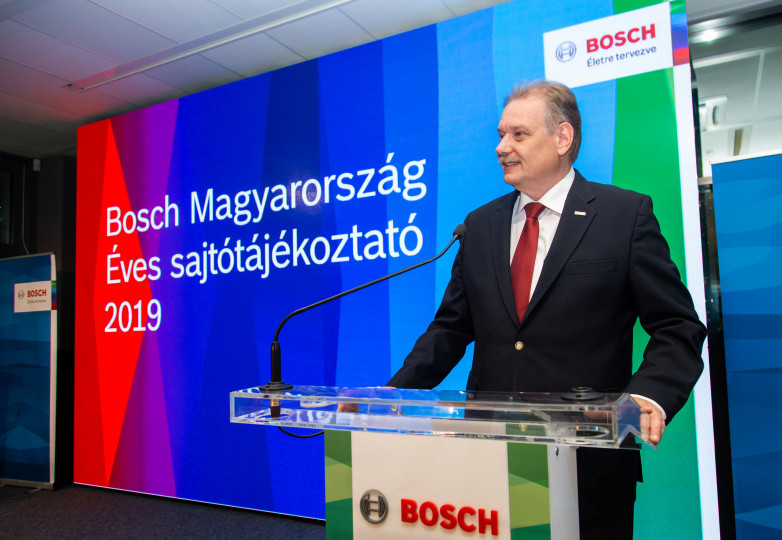Budapest – Bosch, a leading supplier of technologies and services, achieved growth in every area of activity in Hungary in 2018. Total net sales, including sales of non-consolidated companies and internal deliveries to affiliated companies, grew to 1.3 billion forints (4.1 million euros) in 2018, an increase of 13 percent1 compared to the year before. Consolidated sales on the Hungarian market grew by three percent to 251 billion forints (786 million euros) in 2018. The figures for headcount, research and development cost, and capital expenditure increased compared to the previous year. At the company’s regional annual press conference in Budapest, Daniel Korioth, the Representative of the Bosch Group in Hungary, said: “Our company again passed major strategic milestones in Hungary in 2018. In addition to future-orientated development projects, a strong manufacturing capacity and continuous growth, Bosch Hungary stands for outstanding expertise and commitment.” He added: “With the expansion of our presence and business activities, we will continue to contribute to the development of Hungary. For this year, we expect a stable business development based on the company’s local sales in the first three months, which showed an increase compared to the previous year.”
Key role for future-orientated developments and solutions
Bosch funded research and development projects in the areas of mobility solutions and power tools manufacturing amounted to a total of 71 billion forints (223 million euros) in 2018, more than ever before. Its automotive engineers in Budapest, Hatvan, Miskolc and Maklár are working on the mobility of the future, concentrating on the development of automated driving and electric mobility. The Engineering Center Budapest is an increasingly prominent site in Bosch’s global development network, playing an important role in developing automated and electric mobility. The automotive parts plant Robert Bosch Energy and Body Systems Kft. of Miskolc produced its 200 millionth product in 2018 – the site manufactures motors for the electromechanical brake-assistance iBooster system. The iBooster is an important innovation, recovering energy as the brakes are applied, which increases the range of electric cars and further reduces harmful emissions from internal combustion engines.
Robert Bosch Automotive Steering Kft. of Maklár, expert of steerings, celebrated its fifteenth birthday last year. It produces steering systems with a focus on advanced, environment-friendly electric solutions. The Power Tools site in Miskolc also had reason to celebrate: The 100 millionth unit to roll off the production lines was the two-speed cordless drill-screwdriver that is entirely the fruit of efforts by Miskolc staff – from pre-development and conceptual design right up to manufacturing. It is an outstanding example of how development and manufacturing can work together effectively on the same site.
Creative jobs, outstanding expertise
The Bosch Group in Hungary created 1,200 new jobs last year, making Bosch one of the companies with the highest workforce growth in the Hungarian private sector in 2018. “We are very proud of the achievement of our expanding workforce in Hungary,” said Korioth. The company now has nearly 14,800 associates, of whom more than 2,600 work in research and development2. Most of the R&D staff work in the Engineering Center Budapest whereas some 200 of them work in power tools development in Miskolc or at the automotive parts company in Maklár. Korioth went on to say: “The continuous growth of the workforce in Hungary is a clear indicator of the excellent quality my colleagues have delivered over the past decades at all our Hungarian sites. Thanks to this quality and our high level of expertise, Bosch Hungary is at the forefront of creating and manufacturing future-orientated solutions, whether for tomorrow’s mobility or in the consumer business.”
New investments to boost competence transfer and knowledge transfer
Bosch Hungary spent no less than 67 billion forints (210 million euros) on capital projects in 2018. There are investments in progress at every local Bosch site, and all of them have major strategic significance. Last year, Robert Bosch Kft. announced a further expansion of its Budapest headquarters through a 37 billion forint project scheduled for completion by 2021. The development will add a total of 90,000 square metres to the campus of its automotive development facility, the Engineering Center Budapest. In Miskolc, Robert Bosch Power Tool Kft. is adding a 20,000 square-metre production hall at the cost of 13.9 billion forints. This will produce cordless DIY and gardening power tools and their batteries, and batteries for industrial applications. Robert Bosch Energy and Body Systems Kft., also of Miskolc, is investing 14.1 billion forints up to 2021 in the installation of manufacturing and test equipment for new-generation products, plus an extension to the office building. In Hatvan, Robert Bosch Elektronika Kft. is acquiring advanced manufacturing equipment in a 9.6 billion forint project. This will enable the plant, by 2020, to launch production of new-generation products that are crucial for fully-electric and hybrid vehicles.
Bosch, the IoT expert
The Internet of Things, (IoT) is changing our world, and Bosch is taking a leading role in this process. Bosch is shaping future connected mobility with IoT, and making our lives easier with connected devices for the smart home. The products made by Bosch companies in Hungary are not just components. They are shapers of the future. Another crucial part of IoT is Industry 4.0, the application of smart-technology devices to manufacturing. “The factory of the future is now a tangible reality at Bosch, and that goes for our Hungarian operations too. We believe that as part of our commitment to improving quality of life by developing and manufacturing magnificent products, it is increasingly important to safeguard natural resources and make our operations sustainable. Our activities in IoT and Industry 4.0 are supporting this development,” said Korioth. A Bosch project that bears outstanding international significance is the new 60,000 square-metre logistics hub in Hatvan, an important contribution to the company’s commitment to Industry 4.0 and connectivity overall. Scheduled to open in 2019, it will be Bosch’s strategic distribution hub in Central and Eastern Europe, making broad use of Industry 4.0 connected equipment, applications and processes. Among its technological highlights are a cross-dock area and an internal conveyer system with covered passages around the production areas, from where products pass along a spiral track rising above the road, taking them into the warehouse. The hub will have more than 50,000 square metres of usable storage, 2,000 square metres of office space, an 8,000 square-metres of service areas and a sanitary blocks.
Bosch Group outlook 2019: climate action and air-quality measures
The Bosch Group expects global economic development to be subdued in 2019. Despite the difficult environment in industries and regions that are important for the company, Bosch expects its sales in the current year to slightly exceed their 2018 levels. Regardless of the short-term prospects, the company is intensifying its efforts to combat climate change and improve air quality. “Climate change is not science fiction; it’s really happening. If we are to take the Paris Agreement seriously, then climate action needs to be seen not just as a long-term aspiration. It needs to happen in the short term,” said Dr. Volkmar Denner, chairman of the board of management of Robert Bosch GmbH, at the annual press conference in Renningen, Germany. “We’re also committed to meeting public demand for good air quality in cities. As an innovation leader, we want to deliver technological solutions to ecological problems.”
This is why, on the one hand, Bosch is intensifying its already successful efforts to reduce its CO2 output. “We will be the first major industrial enterprise to achieve the ambitious goal of carbon neutrality in a little over a year,” Denner announced. “All 400 Bosch locations across the globe will be carbon neutral from 2020.” On the other hand, Bosch is also pursuing an ambitious target when it comes to air quality: “We want to reduce air pollution from traffic to virtually zero. To do this, we’re looking beyond the car’s hood,” Denner said. In this endeavor, the company will be basing its activities on three pillars: it is developing low-pollutant powertrain technologies, working with municipal governments on projects to maintain steady traffic flow, and implementing a company mobility management system at its own locations.
1 Adjusted for changes in consolidated group in 2017
2 Figures as of December 31, 2018.
Zita Hella Varga
Phone: +36 70 667-6374
Bosch has been present in Hungary since 1898 with its products. After its re-establishment as a regional trading company in 1991, Bosch has grown into one of Hungary’s largest foreign industrial employers with currently nine Hungarian subsidiaries. In fiscal 2018 it had a total turnover of HUF 1,317 billion and consolidated sales of the Bosch Group on the Hungarian market – not counting trade among its own companies – amounted to HUF 251 billion. The Bosch Group in Hungary employs roughly 14,800 associates (as of December 31, 2018). In addition to its manufacturing, commercial and development business, Bosch has a network of sales and service operations that covers the entire country.
The Bosch Group is a leading global supplier of technology and services. It employs roughly 410,000 associates worldwide (as of December 31, 2018). The company generated sales of 78.5 billion euros in 2018. Its operations are divided into four business sectors: Mobility Solutions, Industrial Technology, Consumer Goods, and Energy and Building Technology. As a leading IoT company, Bosch offers innovative solutions for smart homes, smart cities, connected mobility, and connected manufacturing. It uses its expertise in sensor technology, software, and services, as well as its own IoT cloud, to offer its customers connected, cross-domain solutions from a single source. The Bosch Group’s strategic objective is to deliver innovations for a connected life. Bosch improves quality of life worldwide with products and services that are innovative and spark enthusiasm. In short, Bosch creates technology that is “Invented for life.” The Bosch Group comprises Robert Bosch GmbH and its roughly 460 subsidiary and regional companies in over 60 countries. Including sales and service partners, Bosch’s global manufacturing, engineering, and sales network covers nearly every country in the world. The basis for the company’s future growth is its innovative strength. At nearly 130 locations across the globe, Bosch employs some 68,700 associates in research and development.Additional information is available online at www.bosch.com, www.iot.bosch.com, www.bosch-press.com, www.twitter.com/BoschPresse



